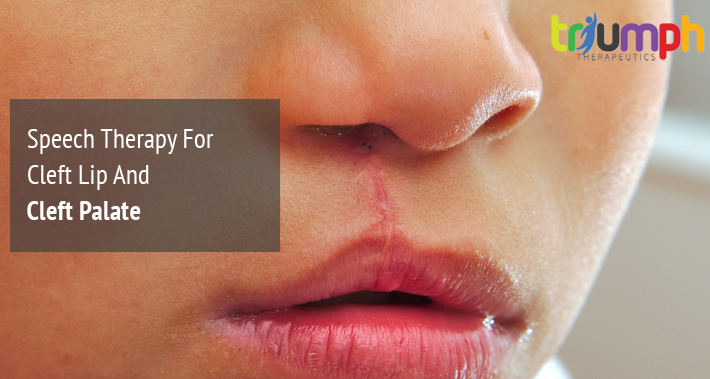Speech Therapy For Cleft Lip And Cleft Palate
https://www.triumphtherapeutics.com/wp-content/uploads/2022/07/Triumph-Therapeutics-Speech-Therapy-OT-Physcial-Therapist-Washington-DC-Jul03-01-2022.jpg 710 379 Triumph Therapeutics Triumph Therapeutics https://www.triumphtherapeutics.com/wp-content/uploads/2022/07/Triumph-Therapeutics-Speech-Therapy-OT-Physcial-Therapist-Washington-DC-Jul03-01-2022.jpgDo you have a new baby with a cleft lip or cleft palate?
These conditions are fairly common, but can still be stressful to navigate as a new parent.
In particular, clefts can cause complications related to feeding and speech.
If you think your child is having speech issues related to having a cleft lip or palate, you don’t have to deal with it alone.
Here at Triumph Therapeutics, our child therapists for speech in Washington DC can help your child manage their cleft lip or cleft palate.
For now, let’s take a closer look at these disorders – what they are, what causes them, and how to treat them.
What Is Cleft Palate & Cleft Lip?
A cleft lip is a split or opening in your child’s lip which can vary in size.
Some cleft lips reach all the way to the nose, while others may only look like a notch in your child’s lip.
A cleft palate, on the other hand, is a split or opening in the roof of their mouth.
There are two sections to the palate. – the hard palate and the soft palate.
The hard palate is closer to the front of your mouth, just behind the alveolar ridge – the ridge just behind your top front teeth.
Your soft palate, on the other hand, is closer to the back of your mouth.
It’s more common for cleft palate to affect the hard palate, but it can affect the soft palate as well.
A cleft lip or cleft palate both mean that the affect part of your child’s mouth didn’t close properly during pregnancy.
Usually, they’re supposed to join during the first trimester of pregnancy.
Cleft lip and palate are among the most common congenital conditions.
According to the CDC, about 1 in 2800 babies is born with cleft lip, 1 in 1700 is born with cleft palate, and 1 in 1600 have both.
Cleft Lip And Cleft Palate Symptoms
Cleft lips are usually visible and can even be seen on ultrasounds before your child’s birth.
Because cleft lip and palate often go together, if your child has a cleft lip they should be inspected for a cleft palate as well.
Cleft palates can only be found after your child is born.
Other symptoms of a cleft palate may include trouble when your baby is feeding.
For example, milk coming out of your baby’s nose instead of easily being swallowed is a feeding issue that may indicate a cleft palate.
They may have missing or extra teeth or trouble with middle ear infections.
Ear infections occur because fluid drainage from the ears (your child’s Eustachian tubes) can be hindered by a cleft palate.
Long term, this fluid being unable to drain can cause hearing issues.
Speech issues as your child gets older are also potential symptoms of a cleft palate.
Cleft Lip And Cleft Palate Causes
While the exact cause of cleft lip and cleft palate is not known, most doctors believe it is caused by a combination of genetic and environmental factors.
If you or your child’s other parent had a cleft lip or palate, the child is more likely to develop one as well.
Some behaviors during pregnancy are linked to an increased likelihood of a child developing clefts as well.
Here are some things that, during pregnancy, may make cleft lip or palate development more likely:
- Being diabetic
- Tobacco use
- Taking recreational drugs
- Alcohol use
- The use of certain medications (ask your doctor)
- Vitamin deficiencies
- Exposure to rubella
Cleft palates and lips can also occur as part of a larger genetic syndrome.
Van der Woude syndrome and velocardiofacial syndrome are two genetic malformation disorders in which clefts are more likely to occur.
How Do Doctors Treat Cleft Lip And Cleft Palate?
Cleft lip and cleft palate may require a large team of doctors to help your child.
Treatment will also depend on the severity of your child’s condition.
Surgery is often required to close the gaps that have developed, as well as reconstructing your child’s face afterward.
Usually, it’s ideal to have a cleft lip repaired when your child is between 10 weeks and 1 year old, and if their cleft is particularly wide they may require a lip adhesion.
Cleft palate surgeries are performed when children are between 6 and 18 months old.
This surgery involves the muscles on each side of your child’s palate being connected together close to the cleft.
Aside from surgery, your child may need help recovering from the effects of living with a cleft palate or lip.
They may need to see an oral surgeon or orthodontist.
If they have developed issues with speech related to their clefts, they may benefit from seeing a speech therapist.
How Do Speech Therapists Treat Cleft Lip And Cleft Palate?
A speech therapist will start by evaluating your child’s unique needs.
Some of the issues that speech therapists can help with include:
- Resonance and airflow
- Articulation
- Speech and language
- Oral mechanism (physical mouth structure)
Children who have cleft lips or palates are likely to have issues with their resonance – the quality that gives their voice fullness.
To help with resonance, your speech therapist will evaluate your child’s vowel and nasal consonant sounds.
They’ll be able to provide support and techniques to help your child improve their resonating sounds, high pressure consonants, and glottal stops.
Your speech therapist will be trained to know if your child is having trouble articulating because of their age or a more structural problem related to their clefts.
Some errors in speech may be because your child is compensating for their oral structure being disrupted.
A speech therapist will also be able to tell if your child has issues with their tonsils, occlusions, or dentition, which may remain as they deal with the effects of having a cleft palate or lip.
Book Your Appointment With Triumph Therapeutics Today
If your child has a cleft palate or cleft lip and you feel they would benefit from speech therapy, don’t hesitate.
The sooner the better is always the case when it comes to your child’s development.
Book your appointment with Triumph Therapeutics today.


